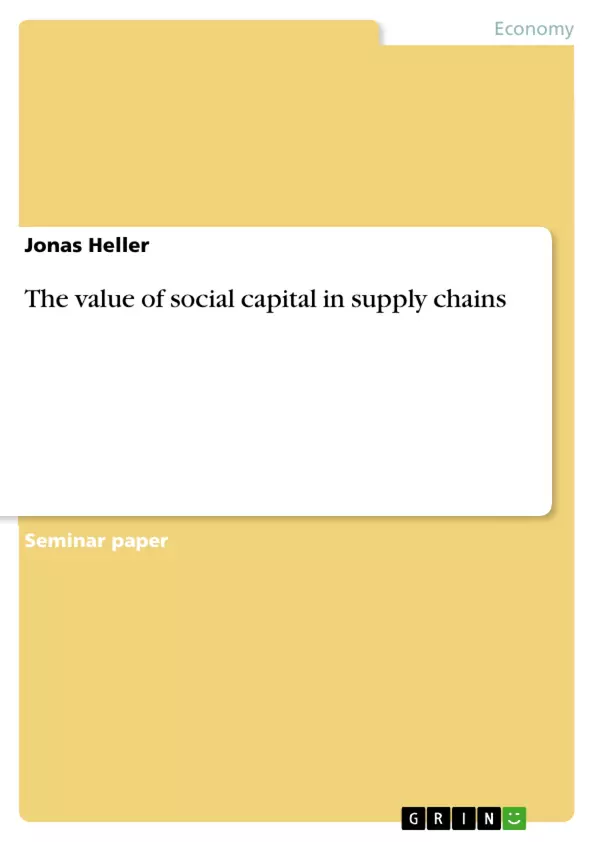Since the development of supply chain management, management and academic researcher have pointed out the importance of social contacts, networks and relationships. Dense networks and loads of relationships were considered as competitive advantage and departments introduced extra budgets to invest in the relationships with any buyer or supplier to increase the social capital between those companies to the maximum, assuming a linear relationship between social capital and performance. However, the emphasis put on the bright side made companies blind for the negative effects of social capital and the fact that the relationship not can be understood as a linear function. This paper reviews selected pieces of literature on the topic of social capital in order to assess the paradox existing around the concept of social capital by studying how a buyer-supplier relationship can be affected positively as well as negatively by social capital. Furthermore, the specific concept of lock-in situations in supply chains will be explained and discussed.
The first section discusses general definitions of social capital and different interpretations of the concept. In two subsections, the positive and negative aspects of social capital will be discussed. Afterwards, the next section will outline the factors influencing the outcomes of social capital. Subsequently, the last section elaborates on how to guard against the negative outcomes of social capital and how to deal with them if they are inevitable. Finally, a conclusion will be drawn and the limitations are addressed.
Inhaltsverzeichnis (Table of Contents)
- Introduction
- Social capital
- The curvilinear relationship
- Positive aspects
- Knowledge creation
- Innovation
- Buyer performance
- Negative aspects
- Costs
- Creativity blockade
- Opportunistic behavior
- What factors are influencing the outcomes of social capital
- Dealing with the dark side
- Conclusion
- Limitations and future research
- References
Zielsetzung und Themenschwerpunkte (Objectives and Key Themes)
This paper aims to investigate the paradoxical nature of social capital in buyer-supplier relationships. It analyzes how social capital can positively and negatively influence the relationship, considering aspects such as knowledge creation, innovation, and buyer performance. The paper also explores the concept of lock-in situations in supply chains, which can result from excessive social capital.
- The curvilinear relationship between social capital and performance
- Positive and negative aspects of social capital in buyer-supplier relationships
- Factors influencing the outcomes of social capital
- Managing the "dark side" of social capital
- Lock-in situations and their impact on supply chains
Zusammenfassung der Kapitel (Chapter Summaries)
- Introduction: This chapter sets the stage by outlining the importance of social capital in supply chain management and introduces the paradox surrounding the concept. It highlights the need to consider both the positive and negative impacts of social capital on buyer-supplier relationships.
- Social capital: This chapter defines social capital and explores its various dimensions, including relational, structural, and cognitive social capital. It emphasizes the role of trust, respect, and shared values in establishing strong social capital.
- Positive aspects: This chapter discusses the positive effects of social capital on knowledge creation, innovation, and buyer performance. It emphasizes how social capital can facilitate information sharing, collaboration, and mutual benefits.
- Negative aspects: This chapter examines the negative consequences of excessive social capital, including increased costs, creativity blockades, and opportunistic behavior. It highlights the risks associated with becoming too dependent on a single supplier or partner.
- What factors are influencing the outcomes of social capital: This chapter explores the factors that can influence the positive or negative outcomes of social capital, such as the level of trust, the density of the network, and the shared goals of the partners.
- Dealing with the dark side: This chapter provides insights on how to mitigate the negative effects of social capital and manage lock-in situations. It suggests strategies for balancing collaboration and independence in buyer-supplier relationships.
Schlüsselwörter (Keywords)
The paper focuses on the concept of social capital in supply chain management, exploring its various dimensions and examining its impact on performance, knowledge creation, innovation, and buyer-supplier relationships. The key terms include social capital, relational social capital, structural social capital, cognitive social capital, lock-in situations, buyer-supplier relationship, trust, respect, shared values, collaboration, and performance.
Frequently Asked Questions
What is social capital in a supply chain context?
Social capital refers to the networks, relationships, and shared values (trust, respect) between buyers and suppliers that can create competitive advantages.
What are the positive aspects of social capital?
It facilitates knowledge creation, fosters innovation, and improves overall buyer performance through better collaboration and information sharing.
What is the "dark side" of social capital?
Too much social capital can lead to increased costs, creativity blockades, and opportunistic behavior, as partners might become too comfortable or dependent.
What is a "lock-in" situation?
A lock-in occurs when a company becomes so dependent on a specific partner due to high social capital that switching suppliers becomes difficult or impossible, even if performance drops.
Is the relationship between social capital and performance linear?
No, research suggests a curvilinear relationship, meaning that social capital is beneficial up to a certain point, after which negative effects may start to outweigh the benefits.
- Citation du texte
- Jonas Heller (Auteur), 2012, The value of social capital in supply chains, Munich, GRIN Verlag, https://www.grin.com/document/280541



